外研版2023年中考英语知识归纳专题复习动词的时态(含答案)
文档属性
| 名称 | 外研版2023年中考英语知识归纳专题复习动词的时态(含答案) | 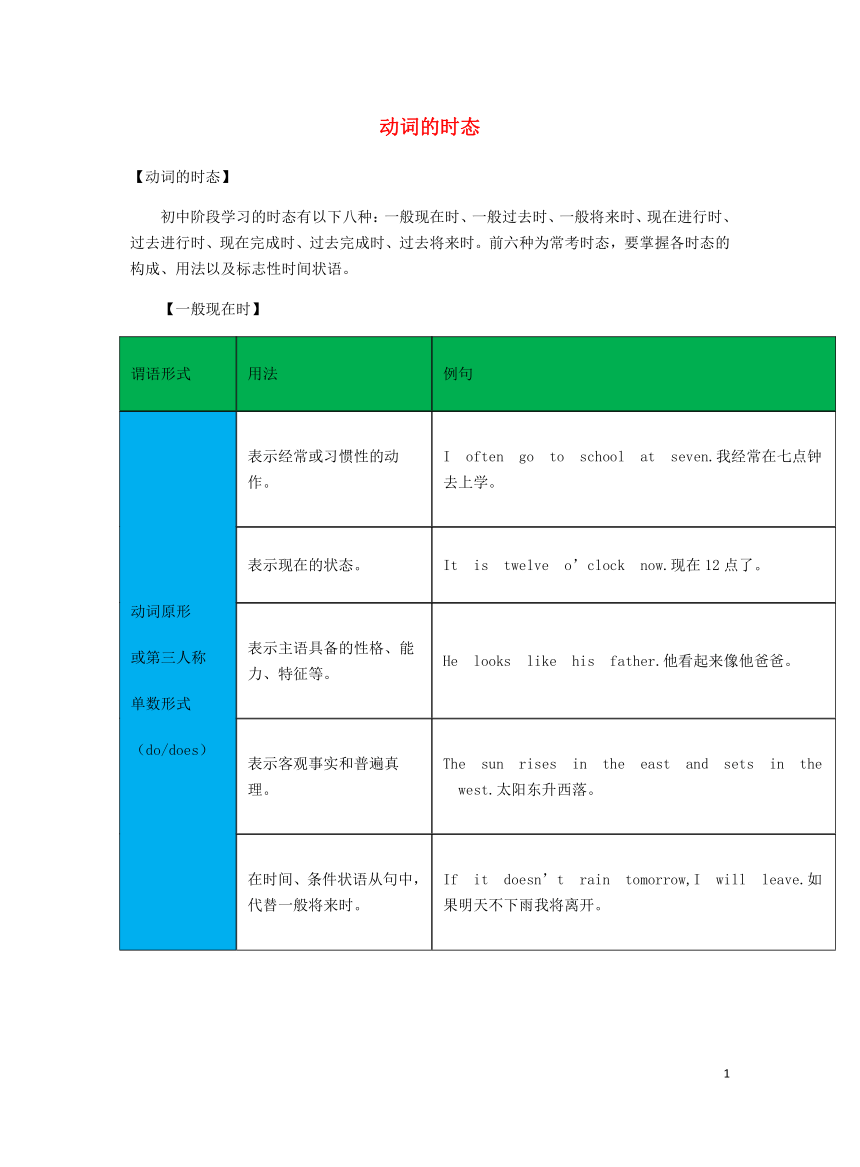 | |
| 格式 | doc | ||
| 文件大小 | 103.3KB | ||
| 资源类型 | 教案 | ||
| 版本资源 | 外研版 | ||
| 科目 | 英语 | ||
| 更新时间 | 2023-04-27 10:03:26 | ||
图片预览

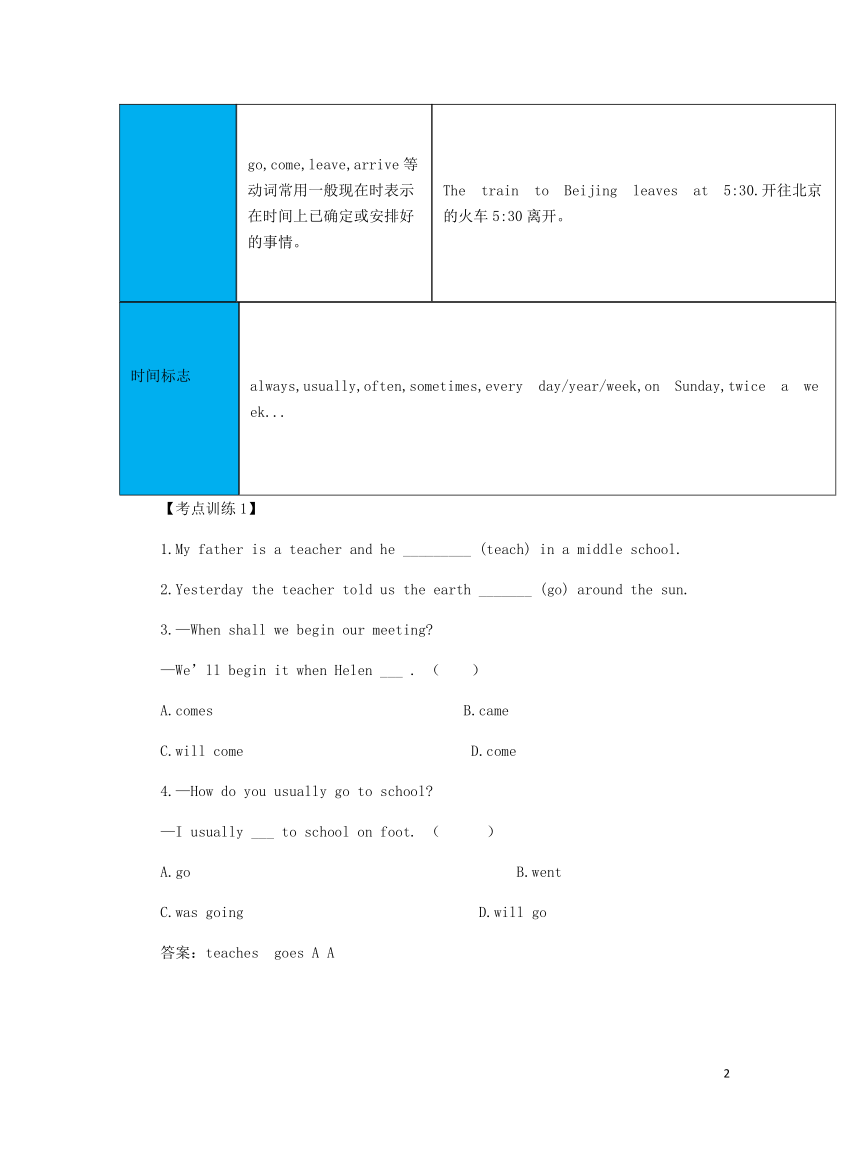
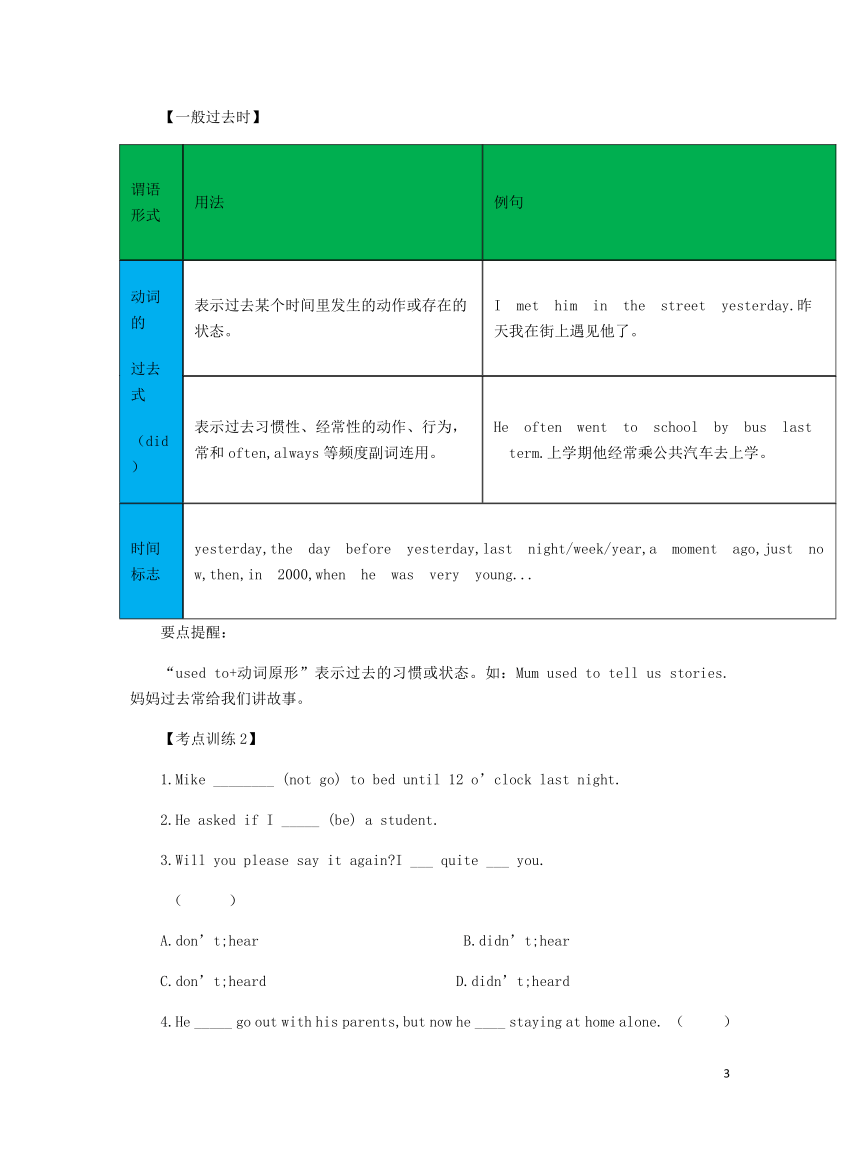
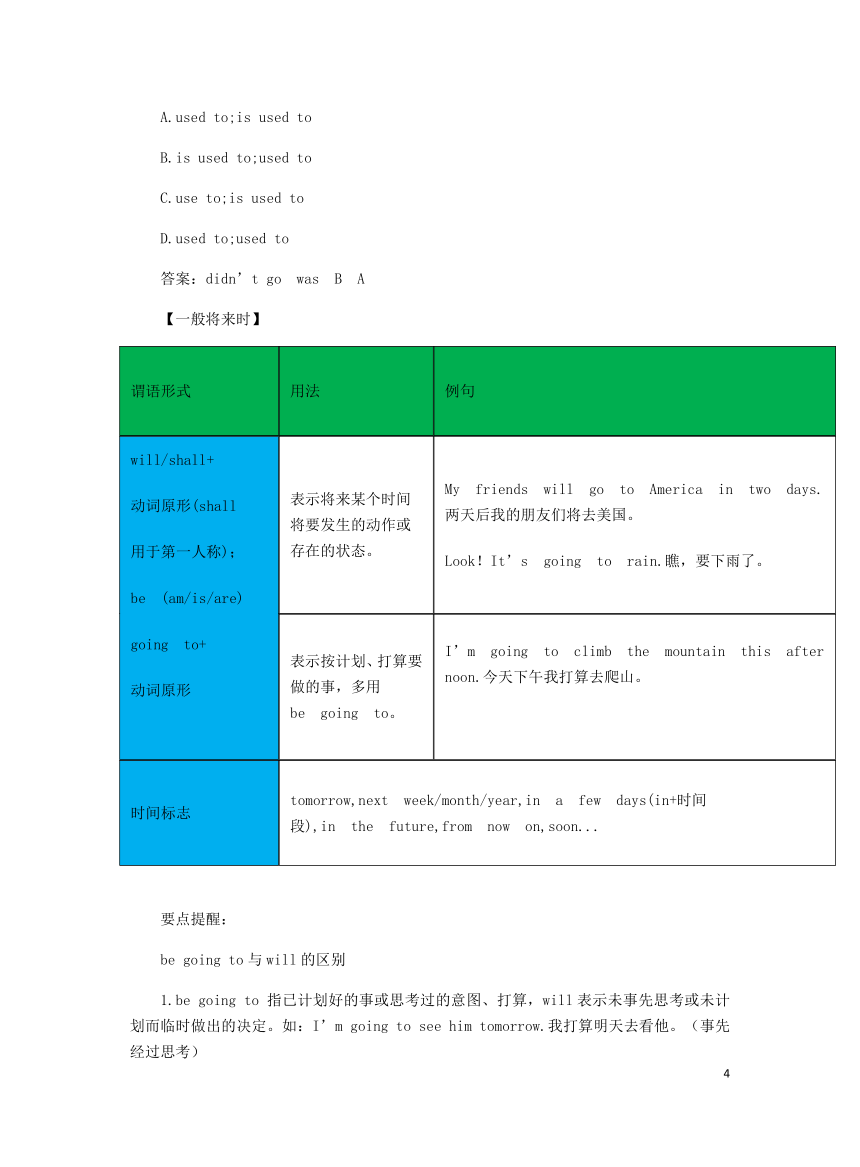
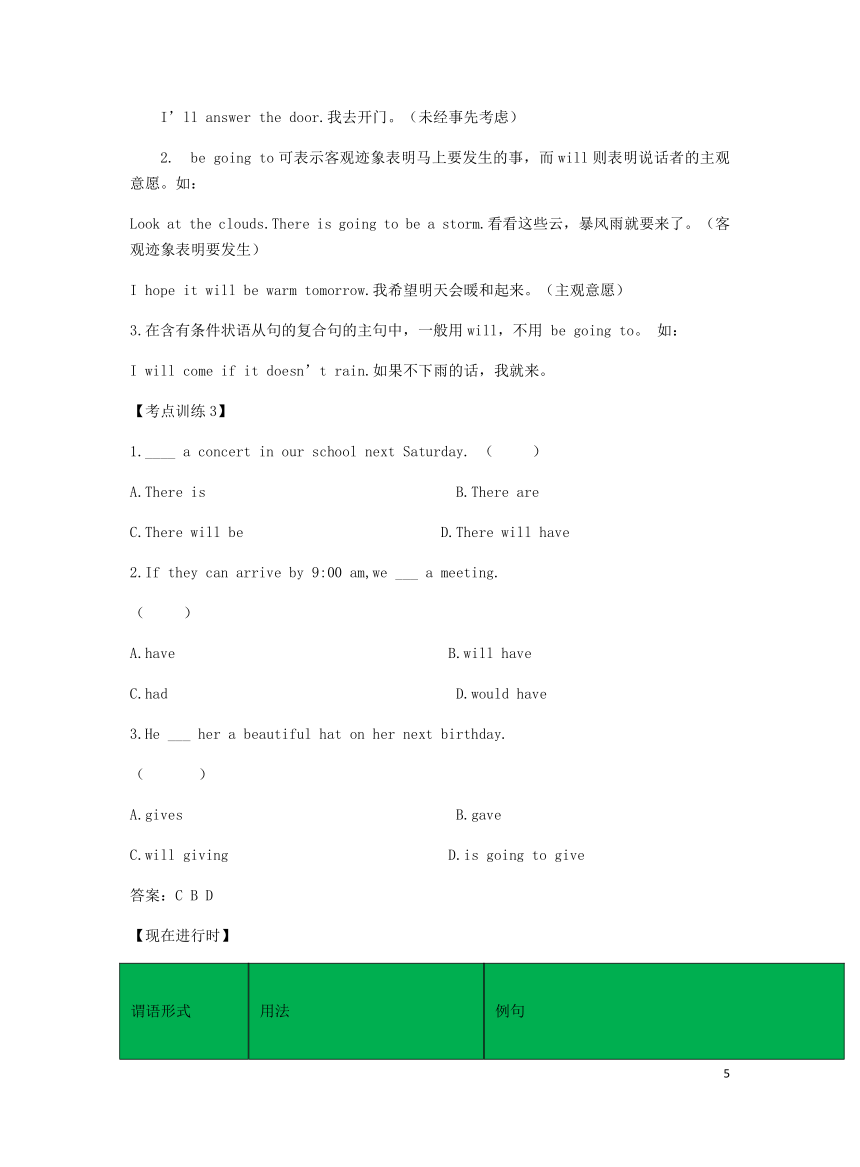
文档简介
动词的时态
【动词的时态】
初中阶段学习的时态有以下八种:一般现在时、一般过去时、一般将来时、现在进行时、过去进行时、现在完成时、过去完成时、过去将来时。前六种为常考时态,要掌握各时态的构成、用法以及标志性时间状语。
【一般现在时】
谓语形式 用法 例句
动词原形或第三人称单数形式(do/does) 表示经常或习惯性的动作。 I often go to school at seven.我经常在七点钟去上学。
表示现在的状态。 It is twelve o’clock now.现在12点了。
表示主语具备的性格、能力、特征等。 He looks like his father.他看起来像他爸爸。
表示客观事实和普遍真理。 The sun rises in the east and sets in the west.太阳东升西落。
在时间、条件状语从句中,代替一般将来时。 If it doesn’t rain tomorrow,I will leave.如果明天不下雨我将离开。
go,come,leave,arrive等动词常用一般现在时表示在时间上已确定或安排好的事情。 The train to Beijing leaves at 5:30.开往北京的火车5:30离开。
时间标志 always,usually,often,sometimes,every day/year/week,on Sunday,twice a week...
【考点训练1】
1.My father is a teacher and he _________ (teach) in a middle school.
2.Yesterday the teacher told us the earth _______ (go) around the sun.
3.—When shall we begin our meeting
—We’ll begin it when Helen ___ . ( )
A.comes B.came
C.will come D.come
4.—How do you usually go to school
—I usually ___ to school on foot. ( )
A.go B.went
C.was going D.will go
答案:teaches goes A A
【一般过去时】
谓语形式 用法 例句
动词的过去式(did) 表示过去某个时间里发生的动作或存在的状态。 I met him in the street yesterday.昨天我在街上遇见他了。
表示过去习惯性、经常性的动作、行为,常和often,always等频度副词连用。 He often went to school by bus last term.上学期他经常乘公共汽车去上学。
时间标志 yesterday,the day before yesterday,last night/week/year,a moment ago,just now,then,in 2000,when he was very young...
要点提醒:
“used to+动词原形”表示过去的习惯或状态。如:Mum used to tell us stories.妈妈过去常给我们讲故事。
【考点训练2】
1.Mike ________ (not go) to bed until 12 o’clock last night.
2.He asked if I _____ (be) a student.
3.Will you please say it again I ___ quite ___ you.
( )
A.don’t;hear B.didn’t;hear
C.don’t;heard D.didn’t;heard
4.He _____ go out with his parents,but now he ____ staying at home alone. ( )
A.used to;is used to
B.is used to;used to
C.use to;is used to
D.used to;used to
答案:didn’t go was B A
【一般将来时】
谓语形式 用法 例句
will/shall+动词原形(shall用于第一人称);be (am/is/are)going to+动词原形 表示将来某个时间将要发生的动作或存在的状态。 My friends will go to America in two days.两天后我的朋友们将去美国。Look!It’s going to rain.瞧,要下雨了。
表示按计划、打算要做的事,多用be going to。 I’m going to climb the mountain this afternoon.今天下午我打算去爬山。
时间标志 tomorrow,next week/month/year,in a few days(in+时间段),in the future,from now on,soon...
要点提醒:
be going to与will的区别
1.be going to 指已计划好的事或思考过的意图、打算,will表示未事先思考或未计划而临时做出的决定。如:I’m going to see him tomorrow.我打算明天去看他。(事先经过思考)
I’ll answer the door.我去开门。(未经事先考虑)
be going to可表示客观迹象表明马上要发生的事,而will则表明说话者的主观意愿。如:
Look at the clouds.There is going to be a storm.看看这些云,暴风雨就要来了。(客观迹象表明要发生)
I hope it will be warm tomorrow.我希望明天会暖和起来。(主观意愿)
3.在含有条件状语从句的复合句的主句中,一般用will,不用 be going to。 如:
I will come if it doesn’t rain.如果不下雨的话,我就来。
【考点训练3】
1.____ a concert in our school next Saturday. ( )
A.There is B.There are
C.There will be D.There will have
2.If they can arrive by 9:00 am,we ___ a meeting.
( )
A.have B.will have
C.had D.would have
3.He ___ her a beautiful hat on her next birthday.
( )
A.gives B.gave
C.will giving D.is going to give
答案:C B D
【现在进行时】
谓语形式 用法 例句
am/is/are+现在分词(doing) 表示说话时正在进行的动作。 They are watching TV now.他们正在看电视。
表示当前一段时间内的活动或现阶段正在进行的动作(常与these days等连用)。 These days we’re working on the farm.这些天我们在农场干活。
与always,forever等词连用表示赞扬、厌恶或不满等情感。 Alice is always thinking of others.艾丽斯总是想着别人。
表示位置移动的动词,如come,go,leave,arrive等常用现在进行时表示最近即将发生的动作。 I’m coming.我这就来。We are leaving tomorrow.我们明天将离开。
时间标志 now,Look!,Listen!,at the/this moment...
【考点训练4】
1.They ____________ (have) a math test in the classroom now.
2.Look! He ___________ (lie) on the beach.
3.—Pass the raincoat to me.It ___ hard now.
—Here you are. ( )
A.rain B.is raining
C.rained D.will rain
4.—Cathy,can you answer the door I ___ the room.
—I’m coming,Mum. ( )
A.Clean
B.cleaned
C.have cleaned
D.am cleaning
答案:are having is lying B D
【过去进行时】
谓语形式 用法 例句
was/were+现在分词(doing) 表示过去某一时刻或某段时间内正在进行的动作(动作发生的时间常用一个短语或时间状语从句来表明)。 I was watching TV at eight o’clock last night.昨天晚上八点我正在看电视。She was reading books all day last Saturday.上周六她一整天都在看书。
与always,forever等词连用表示赞扬、厌恶或不满等情感。 He was forever com?plaining about something.他老是怨这怨那。
时间标志 at that time,at this time yesterday,at 9:00 last night,from nine to ten last night,when/while 引导的时间状语从句等
要点提醒:
1.在含有时间状语从句的复合句中,延续时间较长的动作常用过去进行时,另一个短暂性动作用一般过去时。如:
When the UFO landed,I was shopping at the clothes store.当UFO落地时,我正在服装店买衣服。
2.表示两个延续性动作在过去某一时刻同时进行,不考虑动作的先后顺序,主句和从句的谓语动词都用过去进行时,连词常用while。如:
Tom was doing his homework while I was reading a newspaper.我在看报纸时,汤姆在做作业。
【考点训练5】
1.Mike and I ___________ (play) basketball at that time yesterday afternoon.
2.While Mr.Johnson _______________ (work) in the office,the phone rang.
3.The girl ___ for the bus when the rainstorm came.
( )
A.waited B.have waited
C.is waiting D.was waiting
4.—Jenny,I called you at nine last night,but you didn’t pick up.
—Oh,I ____ a popular program called Go Fighting!.
( )
A.watch B.watched
C.was watching D.am watching
答案:were playing was working D C
【现在完成时】
谓语形式 用法 例句
have/has+过去分词 表示过去发生或完成的某一动作对现在造成的影响或结果。 I have seen the film already.我已经看过这部电影了。
(已知电影内容)表示过去开始的动作或状态,一直持续到现在乃至将来(谓语常用延续性动词,与so far,since/for...连用)。 I have studied in the school since 2009.自从2009年我就在这所学校学习。
时间标志 already,just,yet,so far,up to now,ever,since then,in/during the past...years,“since+过去时间点”,“since+一般过去时从句”,“for+时间段”...
要点提醒:
1.have/has been to,have/has gone to与have/has been in(考点讲解详见P74考点1)
2.延续性动词与非延续性动词英语中的动词按动作发生的方式、发生过程的长短可分为延续性动词和非延续性动词两种,非延续性动词也可称为短暂性动词或瞬间动词。在现在完成时态中,有时要将非延续性动词转换为延续性动词,这样才能和时间段连用。转换方法如下:
(1)将短暂性动词转换为“be+形容词或副词”。请看下表:
begin/start→be on go there→be there
come back→be back come here→be here
open→be open close→be closed
die→be dead marry/get married→be married
finish/end→be over go to bed→be in bed
leave→be away return→be back
get out→be out fall asleep→be asleep
wake up→be awake fall ill→be ill
arrive/reach/get to→be in/at join→be in/be a member of
如:这间商店开门6小时了。
The shop has opened for 6 hours.( × )
The shop has been open for 6 hours.( √ )
有的短暂性动词可以转换为意思相同的延续性动词。请看下表:
borrow→keep(借) become→be(成为)
buy→have/own(买) catch/get a cold→have a cold(感冒)
get to know→know(认识) go to sleep→sleep(睡觉)
put on→wear(穿) receive→have(收到)
如:这本书我借了一个月了。
I have borrowed the book for one month.( × )
I have kept the book for one month.( √ )
3.现在完成时与一般过去时的区别现在完成时强调某一动作或状态对现在造成的影响或结果,不能和表示过去的时间状语连用;一般过去时只表示过去的事实,不表示和现在的关系,可以和表示过去的时间状语连用。如
I bought a ticket yesterday.我昨天买了一张票。(强调我昨天做的一件事是买票)
I have already bought a ticket.我已经买了一张票。(强调我已经有票了,无须再惦记票的事了)
4.现在完成时的其他句型
【考点训练6】
1.— you _____ your homework yet
—Yes.I ______ it a moment ago. ( )
A.Did;do;finished
B.Have;done;finished
C.Have;done;have finished
D.Will;do;finish
2.His father ___ the Party since 1978. ( )
A.joined B.has joined
C.was in D.has been in
3.Miss Green isn’t in the office.She to the library.
( )
A.has gone B.went
C.will go D.has been
答案:B D A
【过去完成时】
谓语形式 用法 例句 图示
had+过去分词 表示在过去的过去发生的动作或存在的状态。 I had had three pieces of cake when you arrived.你来的时候我已经吃了三块蛋糕了。
表示过去某一动作或状态持续到过去另一时间。 The old man had lived in Shanghai for ten years before Tom came here.汤姆来这儿之前,这个老人已经住在上海十年了。
时间标志 by the time...,before,when等构成的短语或引导的从句
【考点训练7】
1.在我们到达电影院之前,电影已经开始了。
The film __________ before we _______ to the cinema.
2.警察赶到时,小偷已经逃跑了。
When the police __________,the thief
____________________ .
答案:had begun got arrived had run away
【过去将来时】
谓语形式 用法 例句
would+动词原形;was/were going to+动词原形 表示在过去某个时间点看将要发生的动作或存在的状态(多用于间接引语或宾语从句中)。was/were going to多用于口语中,表示根据计划或安排即将发生的事。She said she would be back the next day.她说明天她将回来。 Mr.Green told us we were going to have a party at the weekend.格林先生告诉我们周末我们要举办一个晚会。
时间标志 the next day,the following week...
【考点训练8】
1.李明说如果布莱恩下个月来中国,他将会很高兴。
Li Ming said he ___________ happy if Brian came to China the next month.
2.蒂娜说她下周三打算来参加我的生日派对。
Tina said she ________________ my birthday party the next Wednesday.
答案:would be was going to
【中考示例】
(2017·广西)If he _____ Guilin,he’ll probably go to Yangshuo. ( )
A.visits B.is visiting
C.will visit D.has visited
【解析】考查动词的时态。句意:如果他游览桂林,他有可能会去阳朔。if引导条件状语从句时,时态遵循“主将从现”原则,从句中用一般现在时表示将来。
【考题热身】
1.(2017·甘肃)I promise I ________ (send) you an email to explain all of these tomorrow.
2.(2017·甘肃)Be quiet! The patients ______________(sleep).
3.(2017·鄂州)Sandy’s grandparents
__________________ (marry) for 50 years.
4.(2017·台州改编)A true friend always ____________(support) you whenever you are in trouble.
5.(2017·宿迁)I ______________(wash) the dishes while my sister was sweeping the floor.
6.(2017·云南)—What do you think of your hometown, Kate
—It a lot.It’s more beautiful than before. ( )
A.has changed B.changes
C.will change D.change
7.(2017·武汉)—Linda is not coming for the party tonight.
—But she ______! ( )
A.promises B.promised
C.will promise D.had promised
8.(2017·毕节)It’s nice to see you again.We ___ each other since 2016. ( )
A.won’t see B.haven’t seen
C.don’t see D.didn’t see
9.(2017·黔东南)If it doesn’t rain this weekend,we ___ a picnic in the Jinquan Park. ( )
A.have B.will have
C.have had D.had
10.(2017·上海)Some exchange students ___ with their host families this time yesterday. ( )
A.are chatting B.will chat
C.were chatting D.have chatted
11.(2017·重庆B卷)—Where is your uncle I haven’t seen him for a long time.
—He _____ Beijing for about half a year.He moved there in January. ( )
A.has gone to B.has been to
C.has arrived in D.has been in
12.(2017·重庆B卷)John and I ___ to visit his grandparents last Sunday afternoon. ( )
A.go B.went
C.will go D.have gone
13.(2017·重庆A卷)In the past few years,many schools ____ the ways of doing morning exercises. ( )
A.change B.changes
C.will change D.have changed
14.(2017·重庆A卷)As soon as the rain _____ ,they will go out to pick apples. ( )
A.stops B.stopped
C.will stop D.is stopping
15.(2017·河北)Don’t take the dictionary away.I ___ it. ( )
A.use B.used
C.am using D.have used
答案:will send are sleeping have been married supports A B BBCDBDAC
PAGE
1
【动词的时态】
初中阶段学习的时态有以下八种:一般现在时、一般过去时、一般将来时、现在进行时、过去进行时、现在完成时、过去完成时、过去将来时。前六种为常考时态,要掌握各时态的构成、用法以及标志性时间状语。
【一般现在时】
谓语形式 用法 例句
动词原形或第三人称单数形式(do/does) 表示经常或习惯性的动作。 I often go to school at seven.我经常在七点钟去上学。
表示现在的状态。 It is twelve o’clock now.现在12点了。
表示主语具备的性格、能力、特征等。 He looks like his father.他看起来像他爸爸。
表示客观事实和普遍真理。 The sun rises in the east and sets in the west.太阳东升西落。
在时间、条件状语从句中,代替一般将来时。 If it doesn’t rain tomorrow,I will leave.如果明天不下雨我将离开。
go,come,leave,arrive等动词常用一般现在时表示在时间上已确定或安排好的事情。 The train to Beijing leaves at 5:30.开往北京的火车5:30离开。
时间标志 always,usually,often,sometimes,every day/year/week,on Sunday,twice a week...
【考点训练1】
1.My father is a teacher and he _________ (teach) in a middle school.
2.Yesterday the teacher told us the earth _______ (go) around the sun.
3.—When shall we begin our meeting
—We’ll begin it when Helen ___ . ( )
A.comes B.came
C.will come D.come
4.—How do you usually go to school
—I usually ___ to school on foot. ( )
A.go B.went
C.was going D.will go
答案:teaches goes A A
【一般过去时】
谓语形式 用法 例句
动词的过去式(did) 表示过去某个时间里发生的动作或存在的状态。 I met him in the street yesterday.昨天我在街上遇见他了。
表示过去习惯性、经常性的动作、行为,常和often,always等频度副词连用。 He often went to school by bus last term.上学期他经常乘公共汽车去上学。
时间标志 yesterday,the day before yesterday,last night/week/year,a moment ago,just now,then,in 2000,when he was very young...
要点提醒:
“used to+动词原形”表示过去的习惯或状态。如:Mum used to tell us stories.妈妈过去常给我们讲故事。
【考点训练2】
1.Mike ________ (not go) to bed until 12 o’clock last night.
2.He asked if I _____ (be) a student.
3.Will you please say it again I ___ quite ___ you.
( )
A.don’t;hear B.didn’t;hear
C.don’t;heard D.didn’t;heard
4.He _____ go out with his parents,but now he ____ staying at home alone. ( )
A.used to;is used to
B.is used to;used to
C.use to;is used to
D.used to;used to
答案:didn’t go was B A
【一般将来时】
谓语形式 用法 例句
will/shall+动词原形(shall用于第一人称);be (am/is/are)going to+动词原形 表示将来某个时间将要发生的动作或存在的状态。 My friends will go to America in two days.两天后我的朋友们将去美国。Look!It’s going to rain.瞧,要下雨了。
表示按计划、打算要做的事,多用be going to。 I’m going to climb the mountain this afternoon.今天下午我打算去爬山。
时间标志 tomorrow,next week/month/year,in a few days(in+时间段),in the future,from now on,soon...
要点提醒:
be going to与will的区别
1.be going to 指已计划好的事或思考过的意图、打算,will表示未事先思考或未计划而临时做出的决定。如:I’m going to see him tomorrow.我打算明天去看他。(事先经过思考)
I’ll answer the door.我去开门。(未经事先考虑)
be going to可表示客观迹象表明马上要发生的事,而will则表明说话者的主观意愿。如:
Look at the clouds.There is going to be a storm.看看这些云,暴风雨就要来了。(客观迹象表明要发生)
I hope it will be warm tomorrow.我希望明天会暖和起来。(主观意愿)
3.在含有条件状语从句的复合句的主句中,一般用will,不用 be going to。 如:
I will come if it doesn’t rain.如果不下雨的话,我就来。
【考点训练3】
1.____ a concert in our school next Saturday. ( )
A.There is B.There are
C.There will be D.There will have
2.If they can arrive by 9:00 am,we ___ a meeting.
( )
A.have B.will have
C.had D.would have
3.He ___ her a beautiful hat on her next birthday.
( )
A.gives B.gave
C.will giving D.is going to give
答案:C B D
【现在进行时】
谓语形式 用法 例句
am/is/are+现在分词(doing) 表示说话时正在进行的动作。 They are watching TV now.他们正在看电视。
表示当前一段时间内的活动或现阶段正在进行的动作(常与these days等连用)。 These days we’re working on the farm.这些天我们在农场干活。
与always,forever等词连用表示赞扬、厌恶或不满等情感。 Alice is always thinking of others.艾丽斯总是想着别人。
表示位置移动的动词,如come,go,leave,arrive等常用现在进行时表示最近即将发生的动作。 I’m coming.我这就来。We are leaving tomorrow.我们明天将离开。
时间标志 now,Look!,Listen!,at the/this moment...
【考点训练4】
1.They ____________ (have) a math test in the classroom now.
2.Look! He ___________ (lie) on the beach.
3.—Pass the raincoat to me.It ___ hard now.
—Here you are. ( )
A.rain B.is raining
C.rained D.will rain
4.—Cathy,can you answer the door I ___ the room.
—I’m coming,Mum. ( )
A.Clean
B.cleaned
C.have cleaned
D.am cleaning
答案:are having is lying B D
【过去进行时】
谓语形式 用法 例句
was/were+现在分词(doing) 表示过去某一时刻或某段时间内正在进行的动作(动作发生的时间常用一个短语或时间状语从句来表明)。 I was watching TV at eight o’clock last night.昨天晚上八点我正在看电视。She was reading books all day last Saturday.上周六她一整天都在看书。
与always,forever等词连用表示赞扬、厌恶或不满等情感。 He was forever com?plaining about something.他老是怨这怨那。
时间标志 at that time,at this time yesterday,at 9:00 last night,from nine to ten last night,when/while 引导的时间状语从句等
要点提醒:
1.在含有时间状语从句的复合句中,延续时间较长的动作常用过去进行时,另一个短暂性动作用一般过去时。如:
When the UFO landed,I was shopping at the clothes store.当UFO落地时,我正在服装店买衣服。
2.表示两个延续性动作在过去某一时刻同时进行,不考虑动作的先后顺序,主句和从句的谓语动词都用过去进行时,连词常用while。如:
Tom was doing his homework while I was reading a newspaper.我在看报纸时,汤姆在做作业。
【考点训练5】
1.Mike and I ___________ (play) basketball at that time yesterday afternoon.
2.While Mr.Johnson _______________ (work) in the office,the phone rang.
3.The girl ___ for the bus when the rainstorm came.
( )
A.waited B.have waited
C.is waiting D.was waiting
4.—Jenny,I called you at nine last night,but you didn’t pick up.
—Oh,I ____ a popular program called Go Fighting!.
( )
A.watch B.watched
C.was watching D.am watching
答案:were playing was working D C
【现在完成时】
谓语形式 用法 例句
have/has+过去分词 表示过去发生或完成的某一动作对现在造成的影响或结果。 I have seen the film already.我已经看过这部电影了。
(已知电影内容)表示过去开始的动作或状态,一直持续到现在乃至将来(谓语常用延续性动词,与so far,since/for...连用)。 I have studied in the school since 2009.自从2009年我就在这所学校学习。
时间标志 already,just,yet,so far,up to now,ever,since then,in/during the past...years,“since+过去时间点”,“since+一般过去时从句”,“for+时间段”...
要点提醒:
1.have/has been to,have/has gone to与have/has been in(考点讲解详见P74考点1)
2.延续性动词与非延续性动词英语中的动词按动作发生的方式、发生过程的长短可分为延续性动词和非延续性动词两种,非延续性动词也可称为短暂性动词或瞬间动词。在现在完成时态中,有时要将非延续性动词转换为延续性动词,这样才能和时间段连用。转换方法如下:
(1)将短暂性动词转换为“be+形容词或副词”。请看下表:
begin/start→be on go there→be there
come back→be back come here→be here
open→be open close→be closed
die→be dead marry/get married→be married
finish/end→be over go to bed→be in bed
leave→be away return→be back
get out→be out fall asleep→be asleep
wake up→be awake fall ill→be ill
arrive/reach/get to→be in/at join→be in/be a member of
如:这间商店开门6小时了。
The shop has opened for 6 hours.( × )
The shop has been open for 6 hours.( √ )
有的短暂性动词可以转换为意思相同的延续性动词。请看下表:
borrow→keep(借) become→be(成为)
buy→have/own(买) catch/get a cold→have a cold(感冒)
get to know→know(认识) go to sleep→sleep(睡觉)
put on→wear(穿) receive→have(收到)
如:这本书我借了一个月了。
I have borrowed the book for one month.( × )
I have kept the book for one month.( √ )
3.现在完成时与一般过去时的区别现在完成时强调某一动作或状态对现在造成的影响或结果,不能和表示过去的时间状语连用;一般过去时只表示过去的事实,不表示和现在的关系,可以和表示过去的时间状语连用。如
I bought a ticket yesterday.我昨天买了一张票。(强调我昨天做的一件事是买票)
I have already bought a ticket.我已经买了一张票。(强调我已经有票了,无须再惦记票的事了)
4.现在完成时的其他句型
【考点训练6】
1.— you _____ your homework yet
—Yes.I ______ it a moment ago. ( )
A.Did;do;finished
B.Have;done;finished
C.Have;done;have finished
D.Will;do;finish
2.His father ___ the Party since 1978. ( )
A.joined B.has joined
C.was in D.has been in
3.Miss Green isn’t in the office.She to the library.
( )
A.has gone B.went
C.will go D.has been
答案:B D A
【过去完成时】
谓语形式 用法 例句 图示
had+过去分词 表示在过去的过去发生的动作或存在的状态。 I had had three pieces of cake when you arrived.你来的时候我已经吃了三块蛋糕了。
表示过去某一动作或状态持续到过去另一时间。 The old man had lived in Shanghai for ten years before Tom came here.汤姆来这儿之前,这个老人已经住在上海十年了。
时间标志 by the time...,before,when等构成的短语或引导的从句
【考点训练7】
1.在我们到达电影院之前,电影已经开始了。
The film __________ before we _______ to the cinema.
2.警察赶到时,小偷已经逃跑了。
When the police __________,the thief
____________________ .
答案:had begun got arrived had run away
【过去将来时】
谓语形式 用法 例句
would+动词原形;was/were going to+动词原形 表示在过去某个时间点看将要发生的动作或存在的状态(多用于间接引语或宾语从句中)。was/were going to多用于口语中,表示根据计划或安排即将发生的事。She said she would be back the next day.她说明天她将回来。 Mr.Green told us we were going to have a party at the weekend.格林先生告诉我们周末我们要举办一个晚会。
时间标志 the next day,the following week...
【考点训练8】
1.李明说如果布莱恩下个月来中国,他将会很高兴。
Li Ming said he ___________ happy if Brian came to China the next month.
2.蒂娜说她下周三打算来参加我的生日派对。
Tina said she ________________ my birthday party the next Wednesday.
答案:would be was going to
【中考示例】
(2017·广西)If he _____ Guilin,he’ll probably go to Yangshuo. ( )
A.visits B.is visiting
C.will visit D.has visited
【解析】考查动词的时态。句意:如果他游览桂林,他有可能会去阳朔。if引导条件状语从句时,时态遵循“主将从现”原则,从句中用一般现在时表示将来。
【考题热身】
1.(2017·甘肃)I promise I ________ (send) you an email to explain all of these tomorrow.
2.(2017·甘肃)Be quiet! The patients ______________(sleep).
3.(2017·鄂州)Sandy’s grandparents
__________________ (marry) for 50 years.
4.(2017·台州改编)A true friend always ____________(support) you whenever you are in trouble.
5.(2017·宿迁)I ______________(wash) the dishes while my sister was sweeping the floor.
6.(2017·云南)—What do you think of your hometown, Kate
—It a lot.It’s more beautiful than before. ( )
A.has changed B.changes
C.will change D.change
7.(2017·武汉)—Linda is not coming for the party tonight.
—But she ______! ( )
A.promises B.promised
C.will promise D.had promised
8.(2017·毕节)It’s nice to see you again.We ___ each other since 2016. ( )
A.won’t see B.haven’t seen
C.don’t see D.didn’t see
9.(2017·黔东南)If it doesn’t rain this weekend,we ___ a picnic in the Jinquan Park. ( )
A.have B.will have
C.have had D.had
10.(2017·上海)Some exchange students ___ with their host families this time yesterday. ( )
A.are chatting B.will chat
C.were chatting D.have chatted
11.(2017·重庆B卷)—Where is your uncle I haven’t seen him for a long time.
—He _____ Beijing for about half a year.He moved there in January. ( )
A.has gone to B.has been to
C.has arrived in D.has been in
12.(2017·重庆B卷)John and I ___ to visit his grandparents last Sunday afternoon. ( )
A.go B.went
C.will go D.have gone
13.(2017·重庆A卷)In the past few years,many schools ____ the ways of doing morning exercises. ( )
A.change B.changes
C.will change D.have changed
14.(2017·重庆A卷)As soon as the rain _____ ,they will go out to pick apples. ( )
A.stops B.stopped
C.will stop D.is stopping
15.(2017·河北)Don’t take the dictionary away.I ___ it. ( )
A.use B.used
C.am using D.have used
答案:will send are sleeping have been married supports A B BBCDBDAC
PAGE
1
同课章节目录
